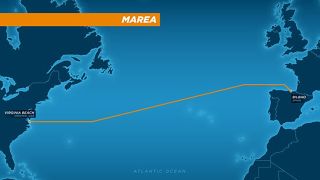Microsoft and Facebook are building a giant internet cable in the ocean
Telecoms should be worried

Facebook and Microsoft announced today their plans to lay a massive data cable in the middle of the Atlantic Ocean. Construction will begin August 2016 and expected to finish in October 2017.
Dubbed "MAREA", Spanish for "tide", the cable will reach over 6,600 kilometers of ocean and will be capable of providing up to 160 terabits per second of bandwidth. It will be the highest capacity subsea cable to ever cross the Atlantic, says Microsoft. The cable will span from Virginia, a major hub for data centers, to Bilbao, Spain. The cable also builds a more efficient path to Africa, the Middle East, and even Asia.
Microsoft says MAREA will bring "lower costs and easier equipment upgrades which leads to faster growth in bandwidth rates." Customers can look forward to reduced latency and reliability with Microsoft's cloud services.
It makes perfect sense for Microsoft and Facebook to collaborate on such a huge project, as having increased bandwidth will benefit both companies. Microsoft runs its own cloud services like Azure and OneDrive, and Facebook is serving billions of people every day. By building their own internet cable, both companies will speed up their services without the need to work with telecoms.
And telecoms should be worried, as Microsoft and Facebook aren't the only tech giants looking to control their own infrastructure. Google is already experimenting with its own fiber internet service and its pay-for-what-you-use mobile internet subscription, Project Fi. It wouldn't be surprising to see Google eventually lay its own transatlantic cable.
Telecoms aren't completely out of the picture just yet, as Facebook and Microsoft brought on Telxius to manage and operate MAREA. Most of the bandwidth will be utilized by Facebook and Microsoft, with the rest being sold to other companies.
- Microsoft bans rubbish passwords following LinkedIn leak.
Get daily insight, inspiration and deals in your inbox
Get the hottest deals available in your inbox plus news, reviews, opinion, analysis and more from the TechRadar team.
Most Popular


